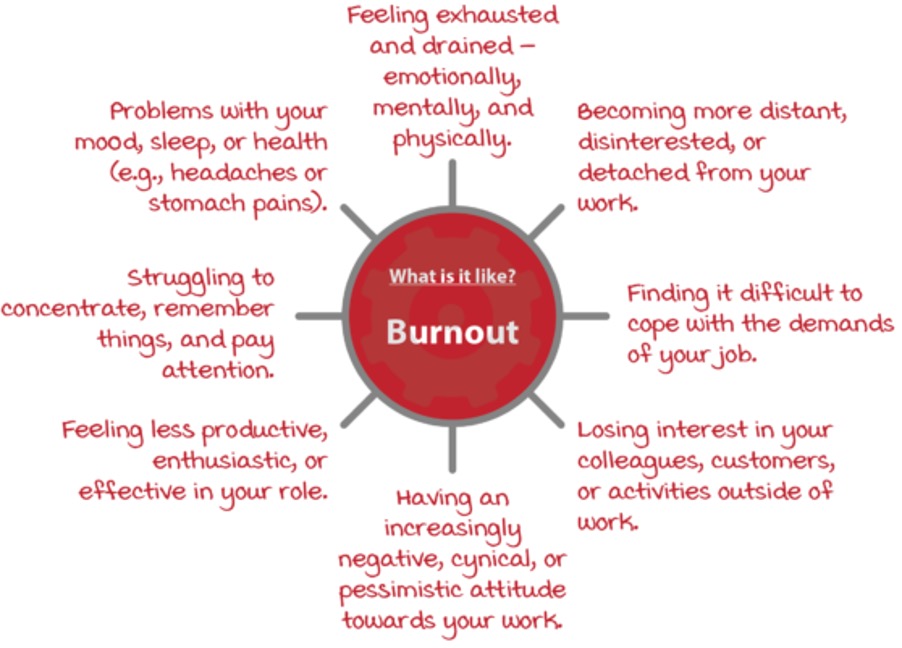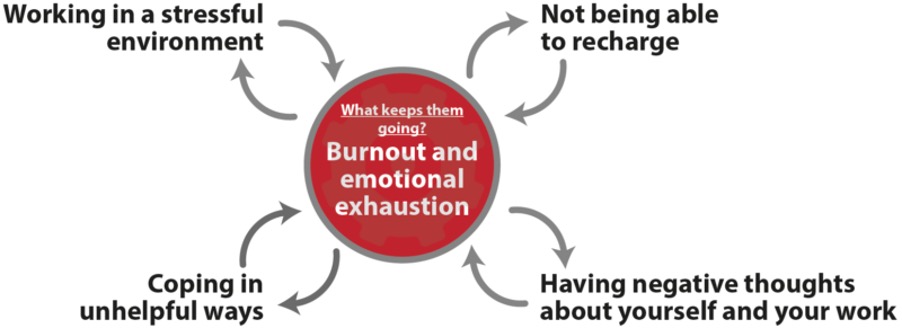Most people go through periods where they feel tired or unhappy at work. However, if your job leaves you feeling emotionally exhausted, beyond the point of caring, or unable to function normally, you might be experiencing burnout.
Burnout is a common issue that can affect almost anyone in any job. Research suggests that around 18% of people in some countries struggle with high levels of burnout, and many more are at risk. While burnout is usually a work-related problem, it can also arise in other settings, such as bereavement, sports, and education.
If it isn’t addressed, burnout can lead to serious difficulties, including problems with your mental and physical health, work, or functioning in daily life. You might be worried about it returning if you've been burned out. The good news is that burnout can be addressed in different ways, whether working at the level of an individual, a team, or an organisation. Compassion Focused Therapy (CFT) is an effective psychological treatment that can help you overcome this issue.
In CFT, we work to challenge these self-critical thoughts by introducing a compassionate perspective.
CFT emphasises understanding that burnout is not a sign of personal failure but a result of the brain and body being overwhelmed by stress.
CFT operates on the concept of three core emotional systems: threat, drive, and soothing.
Burnout occurs when the ‘drive’ system is overactivated, constantly pushing to achieve more, while the ‘soothing’ system, responsible for rest and self-care, is underutilised. People can learn to activate their soothing system, restoring balance and creating a sense of calm and safety.
For more about the three core emotional systems, visit my blog post https://iancartwright.co.uk/2024/11/04/what-is-compassion-focused-therapy/
What is burnout?
‘Burnout’ describes what happens when we feel so depleted by the stresses of work that we struggle to perform. We may feel emotionally drained, unmotivated, and ineffective.
Burnout isn’t something that happens overnight – it’s usually caused by a build-up of stressful things happening inside (and sometimes outside) of work. When you reach the point of burnout, you’ll typically experience some of the following symptoms.

What’s the difference between stress and burnout?
While stress is one of the main causes of burnout, the two are quite different. Most people experience stress as being too ‘full’ of tension, pressure, or anxiety. Burnout, however, feels like you’re extremely ‘empty’ of energy, motivation, or hope.
| When you are stressed… | When you are burned-out… |
| Your emotions are heightened. | Your emotions are dulled. |
| You become more active. | You become more withdrawn. |
| You feel anxious. | You feel low. |
| Your work seems meaningful. | Your work seems meaningless. |
What is it like to struggle with burnout?
Anika’s stresses at work pushed her past the point of caring
I was lucky enough to be offered my ‘dream job’ soon after I qualified. I knew it would be a demanding role, but I was enthusiastic about doing a job that mattered to me.
As I expected, work was challenging from the start. I had to help many people daily, so I had to stay in the office late into the evening, catching up on paperwork. I was so worried about making mistakes that I did everything as thoroughly as possible. What surprised me was how unhappy my team was: they weren’t very welcoming and always complained about their jobs. I tried to keep my distance so the negativity wouldn’t rub off on me.
A few months after I joined the service, my team leader resigned. I was asked to step into his role, which seemed like a great opportunity. Looking back, I can see it was a big mistake. Being a ‘lead’ was very different from the work I’d done before. I still needed to do my usual tasks, but I also had to manage everybody else in the team – I was completely new to that. My co-workers became hostile towards me because they didn’t want to be managed by someone so ‘new’, and every day I felt like I was under attack. What made it worse was how little support I was given. As a senior team member, I didn’t receive any supervision or mentoring. I felt like a pilot flying through a fog, desperately trying to do a good job but with no idea what direction to go.
As time went on, work started to take over my life. My responsibilities increased, so I had to work harder and longer to keep up. I stopped taking breaks and spent my evenings preparing for the day. I also started drinking after work, which probably made my already poor sleep even worse. When the weekend arrived, all I wanted to do was rest and cut myself off from everything else.
Slowly, my stress turned to exhaustion. I felt like I couldn’t keep up anymore, as if the job had defeated me. It’s hard to explain how tired and empty I felt. My attitude towards work also changed. I used to feel passionate about helping people, but by this point, I was past the point of caring. Nothing I did seemed to matter. The problems with my team got worse as well. I avoided interacting with them as much as possible, and whenever I did, I behaved dismissively. I didn’t like the person I’d become.
When I spoke to my GP about my recurrent stomach aches, the idea of ‘burnout’ came up. I thought I might be depressed or just not suited to the job, but my doctor explained that it was a common problem in professions like mine. I hope I can find my enthusiasm for work again.
Am I burned out?
It’s sometimes difficult to notice burnout, particularly if you’ve been struggling with it for a long time or don’t pay much attention to your own needs. It can also look and feel like depression (although depression is a different type of problem and requires a different kind of treatment).
Answering the questions below can give you an idea of whether it is worth arranging a professional assessment.
| Does your work leave you feeling exhausted? | Yes | No |
| Have you lost the energy and enthusiasm you had for your job? | Yes | No |
| Do you ever appear uncaring, disinterested, or insensitive at work? | Yes | No |
| Have you started caring less about your clients or colleagues? | Yes | No |
| Do you think that nothing you do at work makes a difference? | Yes | No |
| Do you feel frustrated, disappointed, or disillusioned with your job? | Yes | No |
| Are you neglecting yourself (e.g., not taking time to rest, eat, or exercise)? | Yes | No |
| Have your family, friends, or colleagues noticed a change in your character? | Yes | No |
If you answered ‘yes’ to most of these questions, you may be struggling with burnout. You can book a free call on my website through this link https://iancartwrightcft.co.uk/my-three-step-process/
What causes burnout?
Burnout doesn’t have a single cause, but there are some things that make you more likely to experience it:
- Your job. Work environments play a big role in burnout. If you have a large workload, long hours, or little control over your job, you may be at greater risk. Burnout has also been linked to having conflicting or unclear roles at work, feeling unsupported, and receiving a lack of feedback from others. Professionals who work in ‘people-focused’ jobs (e.g., teachers and medical professionals) are particularly at risk of severe burnout, but burnout is relevant to all types of work.
- Your personal life. Problems outside of work can sometimes increase the risk of burnout. These include relationship difficulties, financial worries, caring for a family member, and conflicts between work and family commitments.
- Your personality. Some personality traits appear to be related to burnout. If you are the type of person who finds it difficult to cope with stressful events, you doubt your worth or competence, or if you tend to experience more negative emotions and fewer positive emotions, you may be at greater risk of burnout.
- Your beliefs. Some research suggests that your beliefs about yourself and your work can affect burnout. For example, one study found that beliefs about needing to meet high personal standards (e.g., perfectionism) were linked to burnout in trainee therapists. Other studies have found a similar link between perfectionism and burnout.
- Genetic factors. Research evidence suggests that there may be genes that make you likely to develop emotional problems in general, and the same is probably true of burnout. However, your experiences in and around work are likely to play a bigger role.
What keeps burnout going?
Burnout can be looked at through different lenses. It can be seen as an individual problem, an organisational problem, or a problem in our society. Often, all these perspectives are relevant. This means that there are several ways people with burnout can be helped.
Research studies have shown that Compassion Focussed Therapy (CFT) is an effective treatment for burnout.
This diagram suggests several things that keep burnout going once it starts.
These include:

Organisational understanding of burnout
Understanding mental health and well-being issues can be very helpful in the modern workplace.
Mental Health First Aid Training can be very useful. In addition to mental health first aid training, I offer a consultation service to help organisations develop mental health and well-being policies and procedures. This link will provide you with the information you need www.iancartwrightmhfa.co.uk/workplace/




